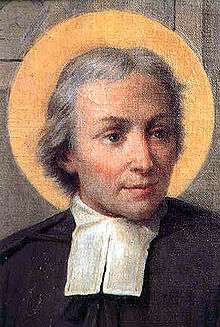The LaSallian
The LaSallian (TLS) is the official student publication of De La Salle University, under the Student Media Office. It is the university's English-language newspaper, composed of the University (News), Menagerie (Features), Sports, Vanguard (Science Writing), Art & Graphics, Photo, Layout, and Web sections. It is released every first week of every month from September to August. Other publications of the university include Ang Pahayagang Plaridel, Malate Literary Folio, and Green & White.
 The October 2008 cover of The LaSallian | |
| Type | Student Publication |
|---|---|
| Format | Broadsheet |
| Owner(s) | De La Salle University |
| Editor-in-chief | Erinne Ong |
| Associate editor | Dab Castañeda |
| Managing editors | Frank Santiago |
| Founded | October 24, 1960 |
| Language | English |
| Headquarters | 502-A Br. Connon Hall, De La Salle University 2401 Taft Ave., Malate, Manila |
| Circulation | 2,500 monthly regular issues 3 special issues |
| Website | http://www.thelasallian.com/ |
The paper's tagline, "The Bastion of Issue-Oriented Critical Thinking", appears below the logo of the front page.
History
Brief history
The LaSallian was first released as the official student publication of then De La Salle College on October 24, 1960, under its first Editor in Chief, Polo Santiago Pantaleon. Its name was given by Ernido Agustin in a contest. A series of major changes started in 1992, when the spelling of the publication was officially changed to The LaSallian. Under 1994-1995 Editor in Chief (EIC) Elegio Cabasug, the Features section was renamed Menagerie, which was later introduced as a separate magazine in 2000-2001 under EIC Faith Santiago. The Spoofs (comics) section was also renamed Poptown. Finally in 2002-2003 under EIC Sarah Espina, the nameplate's font was officially changed from Old English to Times New Roman.
October 24, 1960
The La Sallian (TLS), given its name by Ernido Agustin in a contest, is first released as the official student publication of De La Salle College (DLSC). Polo Santiago Pantaleon is the publication's first Editor in Chief (EIC).
December 1961
TLS releases its first lampoon issue, The Judean Journal.
1963
Under EIC Ramon Henson, TLS receives “an A1 rating for makeup and photography” from the Columbian Press Association of Columbian University
1967
EIC Jesus Manalastas opens Guest Writer, a column space for editors of student publications outside De La Salle. During the decade, the publication prominently features articles on student activism and academic freedom.
1972-1973
EIC Calixto Chikiamco, rumored to be leader of the League of Filipino Students, “Filipinizes” TLS by tackling, among other topics, nationalism, radicalism, communism, and Maoism. De La Salle begins to admit female students; and Irmina Nobleza and Josefina Sayoc were TLS’ first female writers. Noted director Jose “Joey” Reyes writes his first feature article, The Bull's Eye View.
Carmen Reyes becomes TLS’ first female EIC. A fire destroys important documents in the TLS office, and the publication is nearly closed after being found guilty of charges—among them the publication of an editorial entitled Press Freedom Is Dead — by the University Board Review (an administrative body). DLSC becomes DLSU in 1975.
1981
EIC Perry Lim Pe writes the first TLS editorial in Filipino (Mulat). TLS is the first to oppose and report of the University's adoption of the trimester calendar.
1983
Frustrated by what it saw as Lasallian indifference, the publication releases a special issue detailing the active participation of UP and Ateneo in the opposition movement against President Ferdinand Marcos. TLS’ October 1983 editorial, Manila on the March, details the outpouring of anger against the Marcos Administration in the aftermath of Benigno Aquino's assassination.
1986
Shortly after the People Power Revolution, TLS in its June–July issue reports of DLSU's acceptance into the UAAP—six years after withdrawing from the NCAA due to the “Black August” brawl involving several DLSU and Letran men's basketball players.
1992
EIC Jonathan Mendoza changes the spelling of the publication's name to The LaSallian.
TLS, in response to the UAAP Board's decision to forfeit its championship win against theFar Eastern University Tamaraws’ men's basketball team, publishes its shortest editorial to date: “80-77. We played the game."
1994-1997
Under EIC Elegio Cabasug (1994-1995), the Features section is renamed Menagerie, with Ariz Convalecer as its editor. A series of ROTC-related deaths hit campus, prompting an official investigation which led to the expulsion of more than 20 students. An inquiry by EIC Luis Laparan and University (News) Editor Edwin Tumbagan the next year leads to the closure of several establishments serving alcoholic drinks and allowing the play of billiards. TLS has its first co-editors in chief: Luis Laparan and Angel Fortich, 1996-1997.
2000-2001
Under EIC Faith Santiago (2000-2002), the Menagerie magazine is introduced, and the Spoofs (Cartoons) section is renamed Poptown.
2002-2003
In a controversial move to renew the publication, TLS’ editorial board led by Sarah Espina changes the masthead font of The LaSallian from Old English to Times New Roman. TLS is named Best Non-Weekly Newspaper by the United States’ Associated Collegiate Press. A TLS website is opened by succeeding EIC Isabelle Yujuico, but is later closed after being hacked.
2004
A disciplinary case involving EIC Meryll Yan opens the issue of bureaucracy in student services. A year later, she becomes the first editor to be awarded as Most Outstanding Student Leader in Gawad Mag-aaral's history. TLS becomes the first to give details of the new General Education curriculum (which eventually was implemented in 2006-2007). Poptown is transferred from the Menagerie magazine to the broadsheet.
2005
EIC Paul Garilao and University Editor Donelle Gan expose the exploits of a sexually harassing faculty member. TLS covers the University's lead role in the movement to oust Pres. Gloria Arroyo from office, and reports of DLSU's suspension from the UAAP (for fielding ineligible Green Archers). The Multi- Sectoral Committee on Budget sets the lowest ever tuition fee increase at 3.828 percent. TLS releases a tribute in honor of Br. Andrew Gonzalez, who passes away in February 2006.
2006
Under EIC Donelle Gan, TLS details the formation of De La Salle Philippines, the newly formed overseeing body of all Lasallian schools in the country. Paulo Mutuc and Ross Delantar, through the 2005 TLS anniversary special article Corporate Academics, bag TLS’ first Lasallian Scholarum Award for Outstanding Feature Story on Youth and Education in a School Organ. The LaSallian website is re-launched.
2008-2009
In partnership with The Guidon, Ateneo de Manila's official student publication, TLS launches “Pressplay”, a journalism contest and seminar open to college student journalists.
2010
TLS celebrates its golden anniversary under EIC Angel Bombarda. DLSU President Br. Armin Luistro FSC accepts the Department of Education secretary post and TLS is first to report about the changes in DLSU leadership. In addition, TLS breaks the news of the construction of the Henry Sy Sr. Hall under the Centennial Renewal Plan. Photo Editor Adi Bontuyan puts up TLS’ Facebook page and a full- time web team handles the TLS website.
2011
The community celebrates 100 years of Lasallian presence in the Philippines and TLS releases a Centennial Issue in commemoration under EIC Jessy Go. The LaSallian launches its Twitter account on June 16, mainly to provide live coverage of Pres. Noynoy Aquino's visit to DLSU during the Centennial Celebration. Art & Graphics Editor Jerome de Dios leads the redesign and standardization of the broadsheet layout and the masthead font changes from Times New Roman to Arno Pro. The Menagerie is discontinued as a magazine and is released as a separate broadsheet instead.
2012
Under EIC Patrick Ong, TLS wins the Top Division Award of the 1st Philippine Student Quill Awards, as well as the Award of Excellence for its social media presence. The editorial board creates The LaSallian's Instagram account.
2014
TLS is named the third Best Non-Weekly Newspaper by the United States’ Associated Collegiate Press while Menagerie Editor Ysmael Suarez bags the Best Feature award.
2015-2016
EIC Ronaldo Manzano spearheads TLS’ coverage of Pope Francis’ Apostolic Visit to the Philippines. All TLS social media accounts grow exponentially, with the Facebook page first breaking 100,000, then 150,000 likes. The Layout section is separated from the Arts & Graphics section while the Web section is formalized, with Marinel Mamac and Angelika Tirona serving as the first Layout and Web Editors, respectively. Under succeeding EIC Marinel Mamac, TLS delivers live updates and extended coverage of both Pres. Noynoy Aquino's last SONA, and the 2016 National Elections. TLS bags several prizes in the Philippine Student Quill Awards.
2017-present
TLS 57 provides live coverage of the Lasallian initiatives and protests against the Marcos Burial in the Libingan ng mga Bayani. The Editorial Board successfully launches PressPlay 2017 in partnership with The GUIDON after previous efforts to discontinue the event. The LaSallian's Twitter account is officially verified, and breaks 50,000 followers.
Sections
The LaSallian has eight sections, half being the writing sections while the rest are technical sections. These are:
- University - The news section of the publication. It reports and analyzes university and national issues.
- Menagerie - The features section, usually featuring articles on culture inside and outside the university.
- Sports - Reports on all aspects of the university's sports activities.
- Vanguard - The science writing section advances its readers to further understand, grasp, and discern the developments in the field of science and technology.
- Art & Graphics - Provides art for the publication. They are also responsible for Poptown or Cartoons page of TLS.
- Layout - Shapes the readers’ experience by providing and arranging the visual elements needed to capture the spirit and significance of every story.
- Photo - Provides evocative images for the publication to visually enhance articles for a more effective reader experience.
- Web - Manages online content of TLS on their website and social media platforms.
The LaSallian: Magazine?
In February 2008, the publication started releasing their monthly issues in magazine format. In his editor's note, S.Y. 2007-2008 Editor in Chief Paulo Mutuc, the change was made to "come up with is a more harmonious marriage between form and function, between what you want to read and what we think you ought to read." After the school year, the staff members voted for the format in which they would release succeeding issues. Majority of the votes were for the magazine, however, in order for the by-laws (which states that The LaSallian is a newspaper) to be ratified, two-thirds of the staff should vote for the affirmative. Regular issues will continue to be released in the broadsheet format while some special issues may be released in the magazine format.
PressPlay
In SY 2007-2008, The LaSallian and Ateneo de Manila University's official newspaper, The GUIDON, started an annual student press convention called PressPlay in cooperation with the National Union of Journalists of the Philippines (NUJP). It features seminars in writing, editing, photography, and art. Contests are also held for the participants, composed of other student publications. The seminar is held annually on January, and is done alternately in the Ateneo and La Salle campuses.

